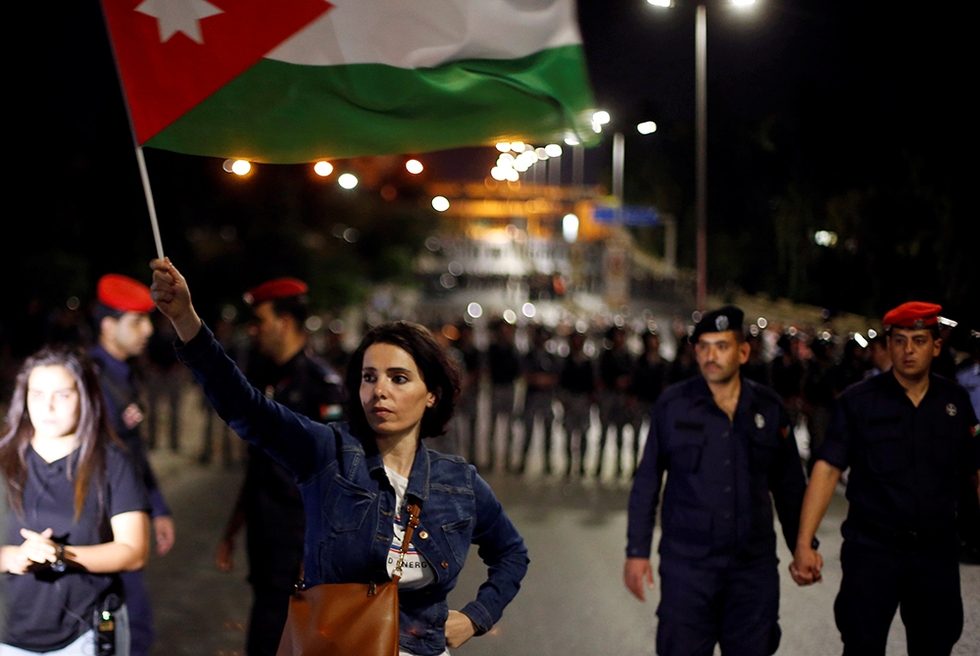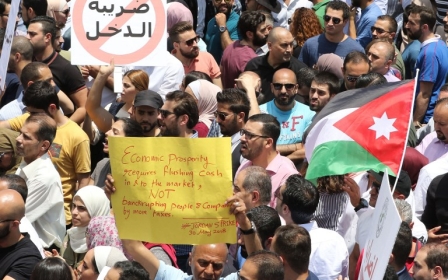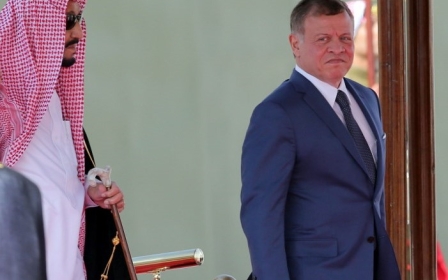Jordan's prime minister quits - but the protests continue

Jordanian Prime Minister Hani Mulki resigned on Monday after five days of mass protests in the kingdom over austerity measures.
The name of Omar Razzaz was circulated in Jordanian media as the upcoming prime minister to form a new government. Razzaz is a former World Bank economist and was education minister in the outgoing government.
Mulki, who was considered a business-friendly politician, was appointed in May 2016 and given the responsibility of reviving a sluggish economy and business sentiment hit by regional turmoil. Price hikes and tax increases have caused his popularity to plummet.
Earlier this year, he reshuffled his cabinet for the sixth time since coming to power in a bid to tackle widespread frustration over increasing hardship and stagnant growth.
In his letter accepting the resignation, the monarch praised Mulki for his "bravery in taking difficult decisions that do not gain popularity" and asked him to stay on in a caretaker role until the new government is formed.
But protesters remained on the streets of Amman on Monday evening on a fifth day of demonstrations in the Jordanian capital and other cities against a draft income tax law and price hikes based on recommendations by the International Monetary Fund (IMF).
The head of Jordan's trade unions said on Monday that protest actions will continue regardless of any changes in the government.
"We need to change the tactic of judgement not only persons," said Ali Aloboos, head of the Jordanian Engineers Association.
The protests, the biggest in Jordan in years, widened on Saturday after Mulki refused to scrap a bill increasing personal and corporate taxes, saying it was up to parliament to decide.
Demonstrators who converged near the Cabinet office said they would disband only if the government rescinded the tax bill it sent to parliament last month.
Jordan's King Abdullah II summoned Mulki on Monday hours after around 5,000 people rallied outside his office in Amman.
Sixty people have been detained for breaking the law in the protests and 42 security force members have been injured, police chief Major General Fadel al-Hamoud said at a news conference on Monday.
"Rest assured, Jordan is a safe and secure country, and things are under control," said Major General Hussein Hawatmeh, head of the Gendarmerie security department, appearing along with Hamoud.
Austerity Jordan
Jordan, a mostly desert kingdom with few resources, has seen prices of several basic goods and services such as bread, fuel and electricity steadily rise over the past year as it attempts to fulfil austerity measures agreed with the IMF.
The IMF approved a three-year extended arrangement with Jordan in 2016 to support economic and financial reform to lower public debt and encourage structural reforms.
Jordan has backed down on reforms in the past, fearing a social backlash. Until Mulki's government, the lifting of bread subsidies and tax changes have been pushed back repeatedly.
Jordan was rocked by unrest in 2012 when the IMF told the government to lift petrol prices.
"They must be able to express themselves and voice their opinions and our duty is to protect them," the crown prince told security forces in reference to the protesters.
"We and they support the king. We want to protect this country," he added.
Last month, the government proposed a new income tax law, yet to be approved by parliament, aimed at raising taxes on employees by at least five percent and on companies by between 20 and 40 percent.
The measures are the latest in a series of economic reforms since Amman secured a $723m three-year credit line from the IMF in 2016.
Jordanian analysts told Middle East Eye that the kingdom has struggled with the loss of investment in recent years from the United Arab Emirates and Saudi Arabia.
It is understood that Abu Dhabi Crown Prince Mohammed bin Zayed called King Abdullah II on Sunday night to discuss the ongoing situation.
The protest campaign started on Wednesday when hundreds responded to a call by Jordan's trade unions by flooding the streets outside the headquarters of the union federation.
Since then, nighttime protests have gripped Amman and other major cities in the cash-strapped country of 9.5 million.
According to official estimates, 18.5 percent of Jordan's population are unemployed, while 20 percent are on the brink of poverty.
The Economist Intelligence Unit earlier this year ranked Jordan's capital as one of the most expensive in the Arab world.
New MEE newsletter: Jerusalem Dispatch
Sign up to get the latest insights and analysis on Israel-Palestine, alongside Turkey Unpacked and other MEE newsletters
Middle East Eye delivers independent and unrivalled coverage and analysis of the Middle East, North Africa and beyond. To learn more about republishing this content and the associated fees, please fill out this form. More about MEE can be found here.





